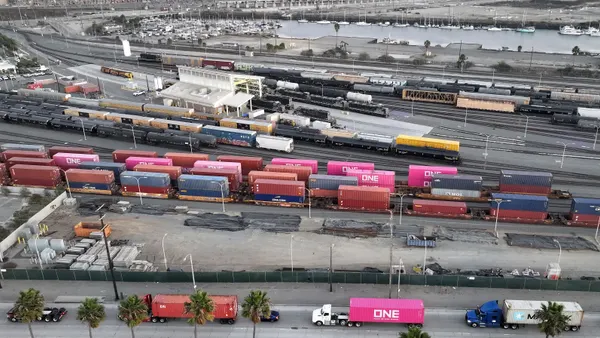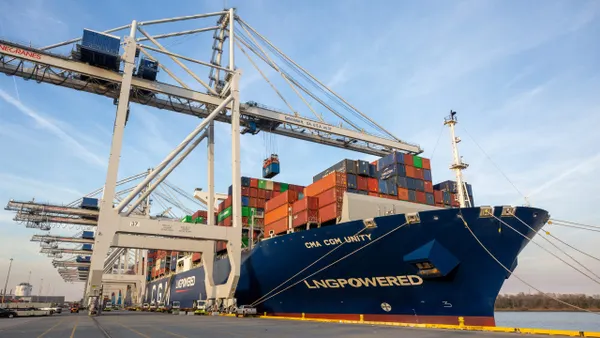Dive Brief:
- The canceled sailings by ocean carriers brought on in response to the drop in consumer demand during the coronavirus pandemic has reached its scheduled peak, according to Sea-Intelligence. But carriers could announce more blank sailings to push the peak out further based on various macroeconomic factors and if carriers don't see shipper demand increase, Sea-Intelligence CEO Alan Murphy told Supply Chain Dive in an interview.
- The Asia-North Europe route had canceled 38% of its capacity as of last week and will experience at least seven weeks where canceled capacity exceeds 20%.
- Ocean carrier schedule reliability dropped to 68% in the first quarter of the year. Sea-Intelligence's data on schedule reliability goes back to 2011 and only the first quarter of 2018 posted lower reliability. This was already trending down at the end of 2019 and began to show some improvement in March, but increased blank sailings in April could result in another drop, Murphy said.
Dive Insight:
The current schedule for ocean carriers shows blank sailings declining in the comings weeks, which is likely an indication carriers are seeing an increased number of bookings, Murphy said.
"But there are no guarantees here," he said. "We're just reporting what's on the books."
The blank sailings related to the coronavirus pandemic have happened in phases. The first phase was the Lunar New Year when blank sailings increase annually as a result of the holiday season. Then came the supply-driven phase when factories in China were shut down. Now the industry is in the demand-driven phase where consumer demand has fallen as a result of stay-at-home orders and social distancing measures. How long this third phase will last is hard to predict, Murphy said.
"If lockdowns go on then suddenly the demand will continue to be low and carriers will have to continue to blank sailings," he said.
Some in the shipping industry have voiced optimism about the shipping volume in April. "We also anticipate higher container volume in April as manufacturing in China normalizes and some U.S. businesses replenish their inventories," Port of Los Angeles Executive Director Gene Seroka said in a press release.
There was a lull in blank sailings in March between the supply-driven and demand-driven phases. Murphy said May is expected to be worse than March in terms of blank sailings.
Carriers cancel sailings as a result of low demand, but shippers still looking to move freight by sea could experience difficulty finding capacity, he said.
"Prior to Coronavirus, I'd say blank sailings was already a top-three issue for nearly all shippers," Murphy said. "It's a high level of disruption when there are very few [blank sailings]."
The long period of capacity cancellations will continue to exacerbate issues with moving empty containers and impede carriers' ability to export cargo to Asia. Carriers have been deploying ships in some cases to help evacuate empty containers, according to The Loadstar. However, there isn't enough capacity for the empty boxes that need to move back to the country where they would be loaded with imports, Murphy said.














